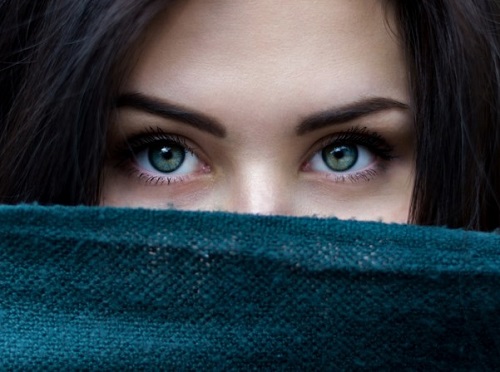FWP:
SETS == IDIOMS
EYES {3,1}
GAZE: {10,12}
For background see S. R. Faruqi's choices. For more on Ghalib's unpublished verses, see the discussion in {4,8x}.
On the nature of a t̤āq or 'niche', see {10,1}, which provides illustrations. Putting things in a niche usually serves to preserve and/or display them; but there's also the 'niche of forgetfulness' in {10,1} itself and in {111,2}. In the case of the present verse, the relevant idiom given by Platts is t̤āq par rakhnā , 'to put on [the shelf of] a niche'; see the definition above. Gyan Chand unselfconsciously uses bālā-e t̤āq rakhnā ; I've seen this latter form of the idiom elsewhere as well. In any case, Ghalib has made the idiom work with paradoxicalness and panache.
As Gyan Chand notes, the shape of the eyebrow suggests the curving arch that overhangs the shelf of a niche. If a lover wants to pay close, consistent attention to the beloved's eyebrow, deciding to place his eyes on a niche-shelf and aim them at her face would seem to be a fine tactic: it would guarantee that they wouldn't move around in their sockets or be accidentally jostled. And in addition, the eyes would be sheltered by the arch of the niche, the way the beloved's own eyes are sheltered by her irresistible eyebrows.
Or, idiomatically, a lover might 'put aside, neglect, abandon, disobey' his eyes (see the definition above)-- and having done this, might then 'always look at' [dekhā karnā] the beloved's eyebrow. What are we to make of this paradoxical suggestion? Surely it pushes us back toward the jo kuchh hai at the beginning of the first line. If indeed 'whatever is/exists' is in any case absorbed in contemplating the beloved's eyebrow, what need for eyes? Perhaps one (mystically) 'sees' better without eyes. The eyes in their rolling around, in the frivolity and fickleness of their attention, might well prove to be only a distraction. Shove them aside, and let the empty eye-sockets 'look', let the face look, let the lover's whole soul and body look.
There seems to be a form of what I call 'grotesquerie' here (pulling out the eyeballs and sticking them on a shelf?!), yet it doesn't seem to be truly activated in the verse itself. It's only latent within the idiom, and if we choose a literal meaning from the tangle of possibilities, it's our own choice and not necessarily Ghalib's (though he certainly set up all the possibilities).
Note for grammar fans: On dekhā kare , see {215,1}.

Zamin:
He became 'absorbed in the beloved's eyebrow' and his eyes were 'put in the niche' because because the eyebrows are a niche. The point is that everyone has become a spectator of the beauty of her eyebrow, and the lover ought to burst his eyes: {158,6}.
== Zamin, p. 381